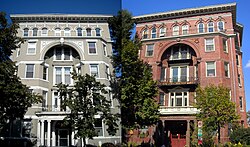Gladstone and Hawarden Apartment Buildings
|
Gladstone and Hawarden Apartment Buildings
|
|

Gladstone (left) and Hawarden (right)
|
|
| Location | 1419 and 1423 R Street NW Washington, D.C., U.S. |
|---|---|
| Coordinates | 38°54′46″N 77°1′59″W / 38.91278°N 77.03306°WCoordinates: 38°54′46″N 77°1′59″W / 38.91278°N 77.03306°W |
| Area | less than one acre |
| Built | 1900 |
| Architect | George S. Cooper |
| Architectural style | Romanesque Revival |
| Part of | Greater Fourteenth Street Historic District (#94000992) |
| NRHP reference # | 94001034 |
| Added to NRHP | September 7, 1994 |
The Gladstone and Hawarden Apartment Buildings are historic twin buildings located in the Logan Circle neighborhood of Washington, D.C. Built in 1900 and 1901, the Gladstone and Hawarden are early examples of middle class apartment buildings in the city. They were designed in the Romanesque Revival architectural style by prominent local architect George S. Cooper. The buildings, since converted into condominiums and a housing cooperative, were added to the National Register of Historic Places (NRHP) in 1994.
On July 7, 1900, a building permit was issued to L. S. Fristoe and S. G. Connell for the construction of an apartment building at 1423 R Street NW. The 20-unit building was named the Gladstone in honor of Prime Minister William Ewart Gladstone. The following year on July 2 another permit was issued to the Gladstone Apartment House Company for an identical apartment building to be located at 1419 R Street NW. The second 20-unit building, the Hawarden, was named for Gladstone's former estate, Hawarden Castle. It is unknown why the developers chose to name the buildings after Gladstone and his estate, but according to author and historian James M. Goode, "Anglophilia current at the time in Washington may offer an explanation." Both buildings were constructed by John H. Nolan, a local real estate developer and builder whose works include the Bond Building, listed on the NRHP. The architect was George S. Cooper, who designed 24 apartment buildings in the city between 1892 and 1909. Several of his works are listed on the NRHP, including the Bond Building, Jefferson Apartment Building, Lafayette Apartment Building, and George Washington University's President's Office. The 1903 book History of the City of Washington states: "It may be thought that Mr. Cooper's forte lies in the designing of apartment houses, since the handsomest in the city are a result of his genius..." and "No young man has played a more important part in the active growth and great development of Greater Washington than George S. Cooper..."
...
Wikipedia

